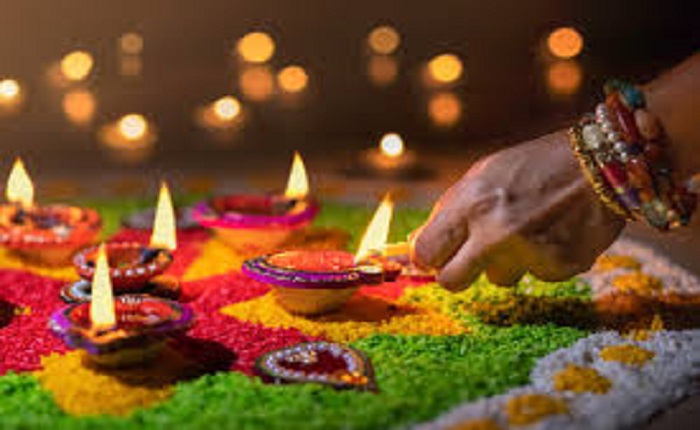
What is Diwali?
Diwali, or Deepavali, is derived from the Sanskrit word “Deepavali,” which means a row of lights. This festival is a celebration of light, prosperity, and the triumph of good over evil. Diwali is a five-day festival, with each day holding a unique meaning and significance. It is celebrated by Hindus, Jains, Sikhs, and Buddhists, each with their own set of rituals and practices.
Diwali 2024 Date
Diwali 2024 falls on Thursday, November 1, 2024. The date of Diwali changes every year because it is based on the Hindu lunar calendar, which does not align with the Gregorian calendar used in most parts of the world. Diwali is observed on the 15th day of Kartika, the holiest month in the Hindu calendar. The festival begins on Dhanteras and ends with Bhai Dooj, a span of five days packed with cultural and religious festivities.
The Significance of Diwali
The core significance of Diwali lies in the ancient stories that are associated with the festival. One of the most famous legends is from the Ramayana, where Lord Rama, his wife Sita, and his brother Lakshman return to their kingdom of Ayodhya after 14 years of exile and defeating the demon king Ravana. The people of Ayodhya celebrated their return by lighting oil lamps (diyas) to welcome them back, symbolizing the triumph of good over evil.
For others, Diwali marks the worship of Goddess Lakshmi, the goddess of wealth and prosperity, while in some regions, the festival celebrates Lord Krishna’s victory over the demon Narakasura.
Diwali: A Five-Day Festival
Diwali is celebrated over five days, each with its own significance. Here’s a breakdown of the five days of Diwali:
Day 1: Dhanteras (November 1, 2024)
Dhanteras marks the beginning of Diwali. It is an auspicious day for buying gold, silver, or new utensils. People clean and decorate their homes to welcome prosperity.
Day 2: Naraka Chaturdashi (November 2, 2024)
Also known as Choti Diwali, Naraka Chaturdashi commemorates Lord Krishna’s victory over the demon Narakasura. People perform early morning rituals and light lamps in the evening.
Day 3: Lakshmi Puja (November 3, 2024)
The main day of Diwali, Lakshmi Puja, is when homes are illuminated with lamps and candles to invite Goddess Lakshmi. Families gather to worship her, seeking wealth and prosperity.
Day 4: Govardhan Puja (November 4, 2024)
Govardhan Puja celebrates the story of Lord Krishna lifting the Govardhan Hill to protect the villagers of Vrindavan from torrential rains. Special prayers and feasts are organized.
Day 5: Bhai Dooj (November 5, 2024)
Bhai Dooj celebrates the bond between brothers and sisters. Sisters perform aarti for their brothers and pray for their long lives, while brothers give gifts as tokens of love.
Why Diwali is Celebrated
Diwali is celebrated for various reasons across different regions and cultures. Primarily, it is a celebration of the victory of good over evil, light over darkness, and knowledge over ignorance. Here are the main reasons why Diwali is observed:
- Hinduism: Diwali celebrates Lord Rama’s return to Ayodhya after defeating Ravana and completing his 14-year exile. It also honors Goddess Lakshmi’s arrival into homes, symbolizing prosperity.
- Jainism: Diwali marks the day when Lord Mahavira, the 24th Tirthankara, attained Nirvana (liberation) in 527 BCE.
- Sikhism: Sikhs celebrate Bandi Chhor Divas on Diwali, commemorating the release of Guru Hargobind Ji from the Gwalior Fort and his return to the Golden Temple in Amritsar.
- Buddhism: In some Buddhist communities, especially the Newar Buddhists of Nepal, Diwali is celebrated to honor Emperor Ashoka’s conversion to Buddhism.
Traditional Diwali Celebrations
The festive spirit of Diwali is seen in the elaborate preparations made by families, friends, and communities. Some common traditions include:
Lighting Diyas: Oil lamps or diyas are placed inside and outside homes to symbolize the victory of light over darkness.
Rangoli: Colorful patterns, known as Rangoli, are created on the floors using colored powders or flower petals to welcome guests and deities.
Fireworks: Firecrackers and fireworks light up the sky, symbolizing the joy of the festival and the defeat of evil.
Gift Exchange: Exchanging sweets, clothes, and gifts is a common practice during Diwali, representing love and goodwill.
Feasting: Families come together for special Diwali feasts, which include a variety of sweets like laddoos, barfis, and jalebis.
Diwali and Goddess Lakshmi
One of the central figures in Diwali is Goddess Lakshmi, the goddess of wealth, prosperity, and fortune. On the night of Diwali, families perform the Lakshmi Puja, where they offer prayers to her, seeking her blessings. Homes are cleaned and decorated in preparation for Lakshmi’s arrival, as it is believed that she blesses only those homes that are clean and well-lit.
Diwali Around the World
Though Diwali is a predominantly Indian festival, it is celebrated by Indian communities and others around the world. In countries like the United States, United Kingdom, Canada, Malaysia, Singapore, and Mauritius, Diwali is observed with grandeur and enthusiasm. Public celebrations, cultural performances, and fireworks displays are often organized in major cities, and the festival has become a way for Indian expatriates to connect with their culture and traditions.
Eco-Friendly Diwali
In recent years, there has been a growing awareness of the environmental impact of Diwali celebrations, particularly with regard to firecrackers. Many people are now advocating for eco-friendly ways to celebrate Diwali by:
- Avoiding Firecrackers: Firecrackers cause air and noise pollution. Opting for quieter and eco-friendly alternatives is becoming more popular.
- Using Organic Rangoli: Creating rangoli designs using natural and biodegradable materials like flower petals and rice powder is a sustainable practice.
- Recycling and Reusing Decorations: Instead of buying new plastic decorations, many people are choosing to make their own using sustainable materials.
Diwali Recipes: Traditional Foods to Enjoy
Food plays an important role during Diwali celebrations. From savory snacks to delectable sweets, the festival is known for its rich and diverse culinary offerings. Some popular Diwali dishes include:
Sweets: Laddoos, barfis, kaju katli, and gulab jamuns are some of the must-have sweets during Diwali.
Snacks: Savory snacks like samosas, kachoris, and chakli are enjoyed by families and guests.
Main Course: Dishes like pulao, chole, and various curries are prepared for family feasts.
Diwali Gifts and Decorations
Diwali is also a time for exchanging gifts and decorating homes. Popular gift options include:
- Sweets and Dry Fruits: Traditional boxes of sweets and dry fruits are exchanged as tokens of goodwill.
- Home Décor Items: Lamps, candles, and diyas make for popular gifts, as they are in line with the festival’s theme of light.
- Jewelry and Clothing: Many people gift gold, silver, and traditional attire like sarees or kurtas during Diwali.
Diwali Celebrations in Modern Times
Diwali in modern times has evolved with changing lifestyles and technology. While the essence of the festival remains the same, the way it is celebrated has transformed. Many urban families prefer digital greetings over traditional cards, and e-commerce platforms have made gift shopping convenient. However, the heart of Diwali – bringing families and communities together – continues to remain strong.
Conclusion
Diwali is more than just a festival; it is a celebration of life, joy, and the victory of good over evil. The date of Diwali 2024, falling on Thursday, November 1, promises to be a grand occasion marked by family gatherings, religious rituals, and colorful celebrations. Whether it’s lighting a diya, sharing sweets, or spending time with loved ones, Diwali brings people together in a celebration of light and love.
FAQs
1. When is Diwali 2024?
Diwali 2024 will be celebrated on Thursday, November 1, 2024.
2. Why is Diwali celebrated?
Diwali celebrates the victory of good over evil, light over darkness, and knowledge over ignorance. It is associated with several legends, including Lord Rama’s return to Ayodhya.
3. How long is the Diwali festival?
Diwali is a five-day festival, starting with Dhanteras and ending with Bhai Dooj.
4. What are some traditional Diwali foods?
Popular Diwali foods include sweets like laddoos and barfis, savory snacks like samosas, and special dishes like pulao and chole.
5. How can I celebrate an eco-friendly Diwali?
You can celebrate an eco-friendly Diwali by avoiding firecrackers, using organic rangoli materials, and opting for sustainable decorations.





